 Petzlover
Petzlover Birman is originated from France but Domestic Mediumhair is originated from United States. Both Birman and Domestic Mediumhair are of same weight. Birman may live 5 years less than Domestic Mediumhair. Both Birman and Domestic Mediumhair has same litter size. Both Birman and Domestic Mediumhair requires Moderate Maintenance.
Birman is originated from France but Domestic Mediumhair is originated from United States. Both Birman and Domestic Mediumhair are of same weight. Birman may live 5 years less than Domestic Mediumhair. Both Birman and Domestic Mediumhair has same litter size. Both Birman and Domestic Mediumhair requires Moderate Maintenance.
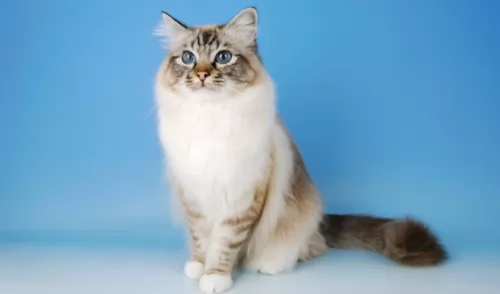 There isn’t clarity as to this exquisite cat’s origins. Many people believe they originated as the companions of temple priests in northern Burma.
There isn’t clarity as to this exquisite cat’s origins. Many people believe they originated as the companions of temple priests in northern Burma.
The cats somehow found their way to France, and it is believed that they have been in France since the 1920s.
The cats nearly disappeared during World War II, but luckily the remaining Birmans that survived were crossed with Siamese and Persians to strengthen the breed. In the early 1950s, pure Birnam litters were produced. It was in about 1959 that Birmans were brought to the United States.
The cats were also recognized in Britain in 1965 and in 1966 by the CFA. The first Birman cats were seal point but later other colors were brought in such as red, chocolate, and tabby.
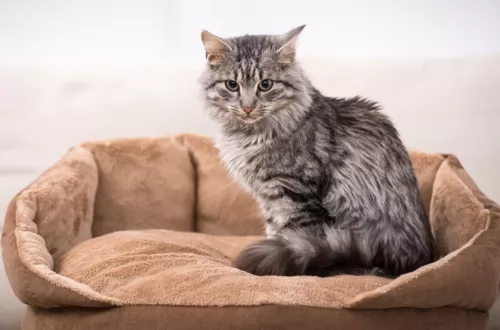 It is unclear as to whether the Domestic Mediumhair comes from Egypt, Europe or the USA.
It is unclear as to whether the Domestic Mediumhair comes from Egypt, Europe or the USA.
It is a mixed breed cat that no one can be sure how it's going to look. It is why they are often referred to as mutts and you’ll likely find them in animal shelters.
It was thought they arrived in America with the Pilgrims, who brought them aboard the ships to take care of the rodent population. Mixed breeding between many generations of cats brought about the Domestic Medium Hair.
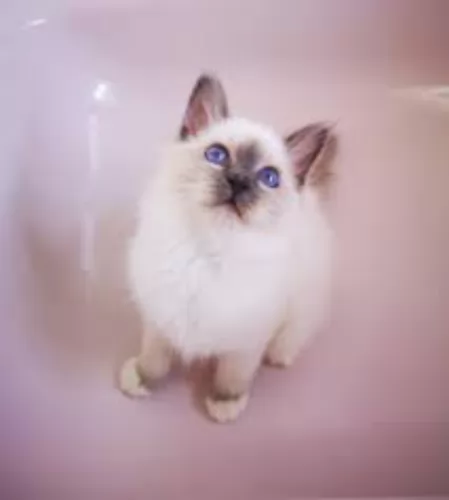 These are medium-sized cats which can become fairly large. They can weigh up to 4, 5 or 6kg. They are fairly heavily boned with a broad face and ears that are widely spaced.
These are medium-sized cats which can become fairly large. They can weigh up to 4, 5 or 6kg. They are fairly heavily boned with a broad face and ears that are widely spaced.
The round eyes are deep blue. The cat’s fur is medium-long and should be silky to the touch with no undercoat. Ther cat is a moderate shedder.
The base color is whitish to cream, but the kittens are always born white. Coat color, whether red, cream, or chocolate is always pointed and the cat always has the white paws.
The Birman isn’t as outgoing as some of the other cat breeds and its a quiet, docile intelligent cat that attaches itself to one particular family member. They can actually become jealous of their human companion and demand their attention.
These friendly cats are wonderful choices for families with children and dogs. They are calm and affectionate, and softly spoken, quietly letting you know when it’s dinner time and enjoying just being around his human family.
He is able to get along well with kids and other pets in the home. He can become quite playful too and because he is so intelligent, you can buy him some toys that require him to think.
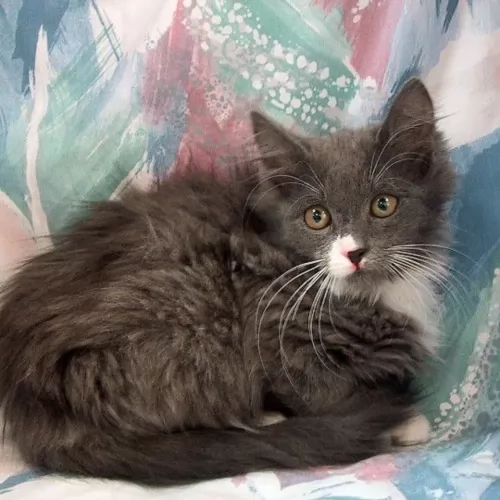 This is a medium-sized cat that weighs in the region of 3 – 6kg. They stand at about 30cm in height but there is no set standard with these cats and their looks and temperaments can vary.
This is a medium-sized cat that weighs in the region of 3 – 6kg. They stand at about 30cm in height but there is no set standard with these cats and their looks and temperaments can vary.
It's a medium built cat, not too thick-set or not too slight. The medium-length coat is thick and double-coated and can be in every color and pattern, including tabby and tortoiseshell.
The eyes can be different shades and the ears large or small too while the tail can also vary in length and bushiness.
Because the Domestic Medium Hair is of mixed ancestry, their temperaments can vary. Some are quiet and docile while other can be very energetic and have a lot to say. Most of them are loving, loyal cats that get on well with childre and other pes in the house. Some are also more independent than others, but a lot can deped on the way you bring your cat up.
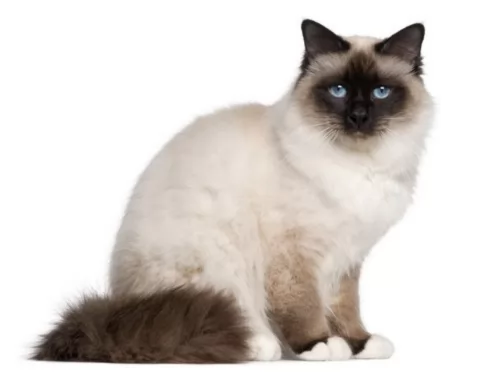 The Birman cat has to be one of the most beautiful cats there are, but the cat isn’t only a beautiful cat, it has wonderful characteristics as well.
The Birman cat has to be one of the most beautiful cats there are, but the cat isn’t only a beautiful cat, it has wonderful characteristics as well.
It is a loving, affectionate cat with his human family, loving to spend time around them. Playful and healthy, when you bring this most wonderful cat into your home, it will be as though an angel has come to stay.
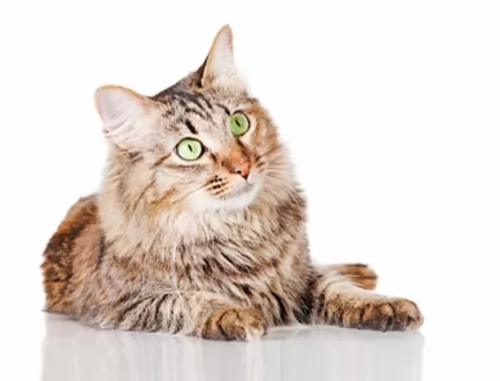 Domestic Medium Hairs come in so many different shapes, sizes and personalities. You’ll also find lots of colors, patterns and personalities with this cat as much depends on the cat’s ancestry.
Domestic Medium Hairs come in so many different shapes, sizes and personalities. You’ll also find lots of colors, patterns and personalities with this cat as much depends on the cat’s ancestry.
Even when you choose a kitten, you can’t really know what you’re going to get – large or small, lively or quiet, independent or needy – its what makes owning a Domestic Mediumhair so fascinating.
One thing every one of them has in common is that they love their human family and they deserve to all receive unconditional care and companionship.
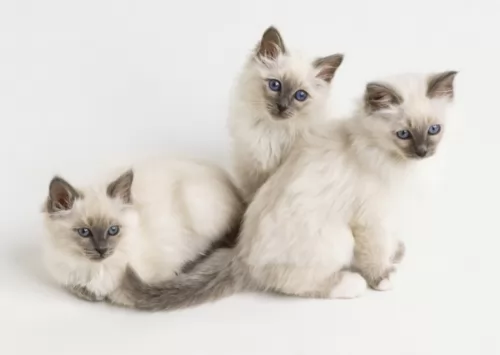 With good health your Birman can reach up to 13 years of age. With the Birman, the most serious illness is feline hypertrophic cardiomyopathy which also happens to be the most common heart disease in cats.
With good health your Birman can reach up to 13 years of age. With the Birman, the most serious illness is feline hypertrophic cardiomyopathy which also happens to be the most common heart disease in cats.
It’s a progressive disease and can result in heart failure. The cats are also at risk of developing feline infectious peritonitis.
Also, because this is a larger cat and a stocky kind of breed, it can easily put on weight and then become overweight. Strict attention will need to be given to diet as well as daily exercise.
Also, look out for Corneal dermoid - skin and hair on the surface of the cornea in one eye or in both. Luckily this is an eye problem that can be surgically corrected.
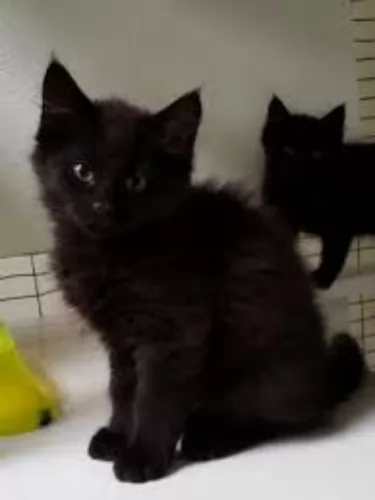 With the Domestic medium hair cat having a mixed ancestry, they are cats that don’t easily succumb to illness.
With the Domestic medium hair cat having a mixed ancestry, they are cats that don’t easily succumb to illness.
You’ll find that the health issues that are common to this cat are typically common to all cat breeds. Some of these typical illnesses are diabetes, kidney disease, obesity, dental problems and hypertrophic cardiomyopathy, a heart disease.
All these illnesses can shorten your cat's life. Gut health is of critical importance so be sure to provide your cat with a top-quality diet.
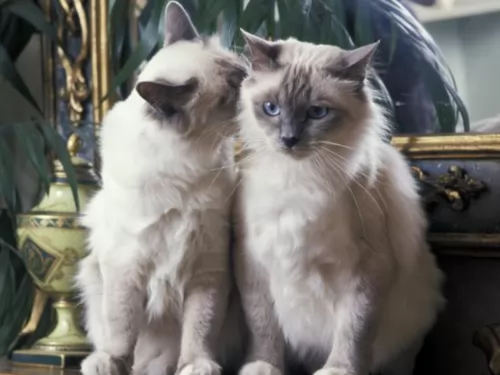 The Birman has a silky coat that sheds moderately so you want to give him a gentle brush once or twice a week to keep the coat of his soft and silky.
The Birman has a silky coat that sheds moderately so you want to give him a gentle brush once or twice a week to keep the coat of his soft and silky.
The Birman has a full topcoat, with no undercoat which means that you won’t have the coat matting or tangling.
He’ll need his nails trimmed and his teeth checked regularly. Your vet or professional groomers can do this for you and clean his teeth and check that there are no bad teeth making your pet sick.
The Birman cat has access to some great commercial cat food as there are some seriously good quality ones.
Many cat lovers choose cat foods that are AAFCO (Association of American Feed Control Officials) approved. It at least provides minimum standards for pet foods.
For your Birman you want to avoid artificial flavors and preservatives. Choose quality foods high in meat protein. As a carnivore, a cat has a huge need for meat protein. Get to know your pet food labels and choose foods with added taurine and vitamin A.
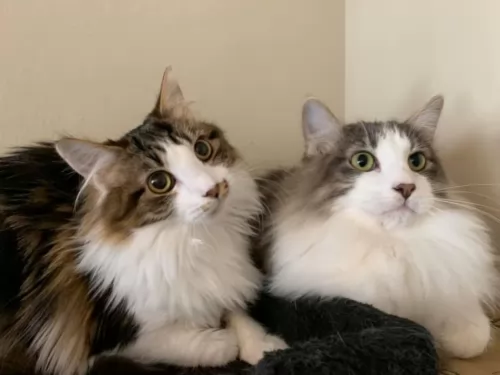 The Domestic Medium Hair has a thick, double coat, and to avoid hairballs and matting, he will need to be brushed at least once a week. Set aside this brushing time to examine your cat’s eyes, the inside of his ears, inside his mouth for bad teeth, to check the length of his claws and to feel for unusual new lumps.
The Domestic Medium Hair has a thick, double coat, and to avoid hairballs and matting, he will need to be brushed at least once a week. Set aside this brushing time to examine your cat’s eyes, the inside of his ears, inside his mouth for bad teeth, to check the length of his claws and to feel for unusual new lumps.
Your cat's diet is as important as life itself. Your cat is a carnivore and should be fed meat. He won’t do well on carbs. Speak to your vet if you’re unsure about how to feed your cat.
Meanwhile, there are some excellent commercially manufactured cat foods on the market and if you choose the best ones with meat at the top of the ingredients list, you can be doing the right thing.
Kittens start with 4 meals a day while the older cat will do well on 2 meals a day. It is most important to feed your kitten the very best food – the correct diet – because their bones, brain, coat and energy all depend on this for the rest of their lives.
Remember too that there are cat foods that cater to the different seasons of your cats life. A kitten, young adult, energetic breed, pregnant cat, a cat with disease, and a senior cat will all have a choice of foods made by the top brand cat food manufacturers. Each food caters specifically for the cat’s unique needs.
Keep your cat's vaccines and de-worming up to date. Parasites left unchecked can make your cat sick.
You can provide your cat with all the best food, toys, comfy bedding and medical care you like, but if you don’t provide him with love and attention, it will all be in vain.